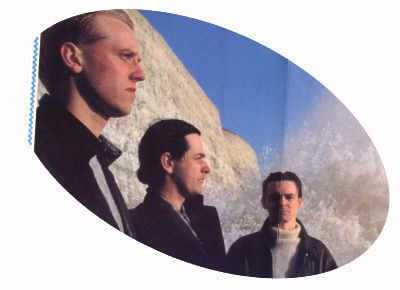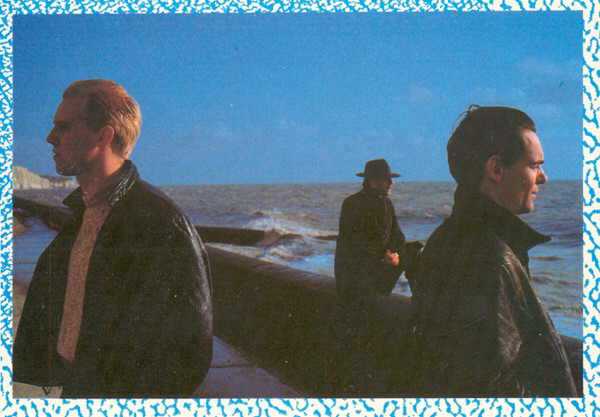HISTORY
BIOGRAPHY from songbook "The Luxury Gap"
 |  |
 |  |
Sheffield, 1973: Three young lads met for the first time at a youth drama project called Meatwhistle. Their backgrounds were not dissimilar, they were all barn and bred in Sheffield, they all came from working class families and they were all looking for something more interesting out of Me than Sheffield traditionally had to offer Glenn and lan were still in the last throes of their secondary education (Glenn had little interest in attaining further qualifications and lan was about to be expelled, being labelled "an undesirable subversive element"; Martyn had finished and failed his A levels at Sheffield's top grammar school, losing interest in the final year, and had consequently become a trainee manager at a ca-operative grocery store. lan and Glenn attended this drama workshop/youth club as a means of avoiding work at school and Martyn, who at the time was regarded as somewhat of an eccentric due to his bizarre clothes-sense, found this equally eccentric bunch of people more to his liking than his more middle class friends from school days. This environment was to be the breeding ground for many and varied creative ideas. As no one really took any notice of the supposed basis on which the workshop was set up, they, together with others, created fantasy musical groups which of course never played outside the confines of the building. These had such imaginative names as Musical Vomit, Dick Velchro and the Space Kidettes, Underpants, Totem Pole, The Hari Willey Krishna Band, Androids Don't Bleed, and many others. It was around this time that lan bought his first synthesizer, a series of modules in kit form which he bought from an electronics hobby magazine. This machine had an impressive array of knobs and switches together with a four-octave keyboard and joy sticks. However, having caught a glimpse of the lack of hardware inside the enormous case, it became easier to understand why it was only capable of producing a wide range of motorcycle noises. After a while, Martyn also purchased his first electronic instrument, which was a dual-stylus stylophone. Glenn meanwhile, tended to be the vocalist in the majority of the aforementioned groups. It should perhaps be mentioned at this stage that all three tried to play guitar at one time or another, but as Martyn remarked, "All it did was make my fingers sore"!
In the years previous to 1977, Martyn and lan had both become computer operators, working for separate companies. This enabled them to raise finance to purchase their first real synthesizers, Martyn bought a Korg 770S and lan bought a Roland System 100). Using their new toys, lan and Martyn went on to form a group called The Future with a friend, Adi Newton. They recorded their first ever demos on their erst ever tape recorder and took them to ten major record companies in London. Although a few showed interest, none offered the group a deal and consequently the group split up without having played a single live date. Part of the problem of The Future was it had no real vocal identity and lan and Martyn knew they had to find a conventional lead vocalist. Ironically, a few months previously, Glenn had moved down to London to seek his fame and fortune; had he still been living in Sheffield, he could well have been the original singer for the Human League. As it transpired Philip Oakey, who was a long time friend of Martyn's from school was drafted in, with no previous experience whatsoever. The next two years saw the rise from obscurity of the Human League, to critical acclaim but without the accompanying commercial success. They released several singles, two albums, did several tours, but never really looked like breaking into the wider public view. This obviously led to discontent within the group and the subsequent separation in 1980. The group split straight down the middle, one half retaining the name and carrying on with the original premise of being an all electronic pop group, while Heaven 17 started anew. Disillusioned with the conventional group/manager structure, Martyn and lan, under the guidance of Bob Last, the League's manager, founded the British Electric Foundation which was a real production company under which they could easily exploit their talents in more diverse ways. At the same time as this Martyn told Glenn, (who was visiting Sheffield) about the split of the group and asked him if he would like to sing with himself and lan on some new demos which they were preparing for Virgin Records in time for Christmas. Prior to this, Glenn had been singing with a London group called 57 Men, whose career was now floundering, and Glenn accepted the offer. Amongst those early demos, recorded at the League's own 8-track studio in Sheffield, were the tracks "Fascist Groove Thang", "Let's all make a Bomb", "I'm Your Money", and others that went on to comprise some of the songs on Heaven 17's first L.P. "Penthouse and Pavement".
Virgin signed the group on the basis of these and 'Fascist Groove Thang' was released early in 1981 to massive critical acclaim. However, although record reached number 42 in the British charts, no radio station, apart from Radio Luxembourg, would play the record, due to the controversial nature of the lyrics. A version of the song with the "fascist" replaced by "axis", and also the line "Reagan President elect, fascist God in motion" replaced by "cowboy God in motion", was rapidly recorded and a thousand copies pressed for D.J.'s but by this time, the record sales were starting to wane. The major discovery of this period was the phenomenal young black bass and guitar player, John Wilson, who fortuitously happened to be working the Crucible Theatre with Glenn as a stage hand when Glenn asked if anyone could play a guitar solo in the middle of "Fascist Groove Thang". To this day John remains a vital part of Heaven 17's identity. The fallow-up single to "Fascist Groove Thang", "I'm Your Money", failed to reach the top 75 in Britain, and focused the group's attention an creating the highly acclaimed first album, "Penthouse And Pavement", which was re late in 1881. The reached reached Top 20 in, Britain and sold very well in many other territories around the world and also received the critic's top album of the year award in several countries. The single "Play to Win" was released and reached, again, the boundary of the Top 40, as did the "Penthouse And Pavement" single. These songs, although not having major commercial success, consolidated their growing and loyal following in night clubs the across the world. This led to sever public appearances at large night clubs where Ian,Martyn and Glenn sang live vocals over backing tapes, the most successful of which was at New York's famous discotheque Studio 54. To this day this is as near as Heaven17 have come to playing a conventional live concert.
While Martyn and Ian were working on B.E.F.'s "Music Of Quality And Distinction" album, a 12 " remixed version of "At The Height Of The Fighting" was released, which predictably didn't get near the Top 40. This was to be the last single that Heaven 17 released for nine months "Let Me Go," was released late in the Autumn of 1982, which was the first time that Heaven 17 had worked with engineer and co-producer Greg Walsh (brother to Pete Walsh who worked on "Penthouse And Pavement"). This marked a new development in Heaven 17's sound, still dance oriented, but more melodically and structurally complex. Once again this single was immensely popular in night clubs, especially in America where the 12" stayed at number 4 in the Billboard dance charts for six weeks. Although it was the most successful single chartwise in many territories that Heaven 17 ever had released, the big hit still eluded them. By Christmas 1982, then "Luxury Gap" album had been finished. This was recorded on 48 track in some of the best studios in London and in collaboration with an orchestra, the Earth Wind and Fire horn section, Carol Kenyon, Simon Phillips, Nick Plytas and many others. The single from the L.P. "Temptation", proved to be the breakthrough in Britain that Heaven 17 had been waiting for. It reached number 2 in the singles charts and the L.P. reached number 4 in the album charts.
Already the boys are itching to get on with the third album which should be completed by Christmas 1983. A significant new musical direction should be provided by the recent purchase of Ian of a Fairlight Computer Musical Instrument, which should cut down studio time and greatly increase the musical possibilities open to our three intrepid heroes. And, as the have commented in several interviews, it took them a while to get there, but they intend to be around for a very long time.